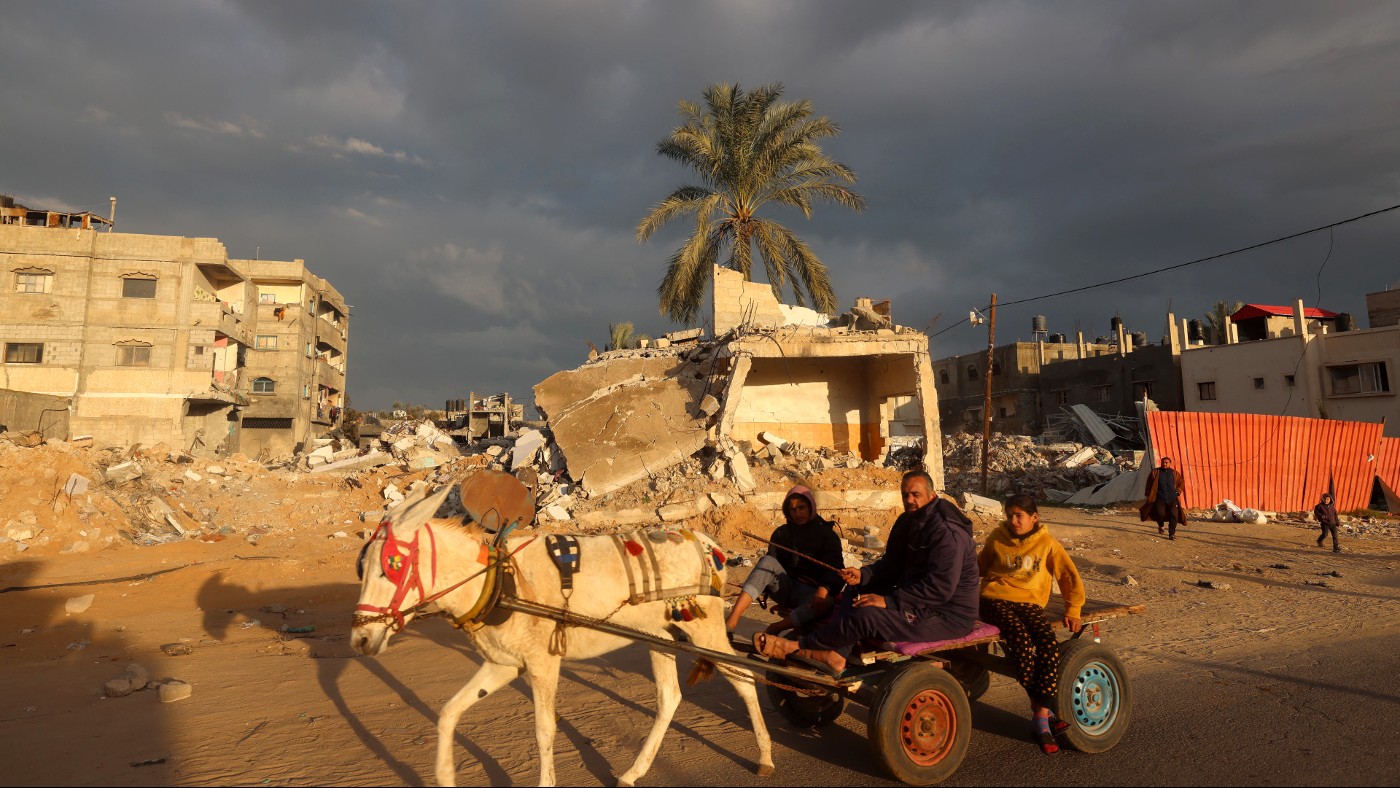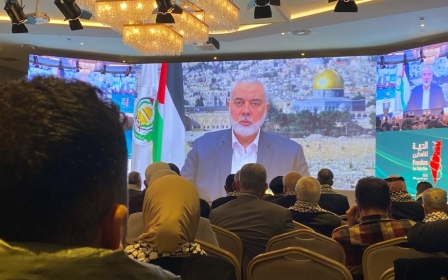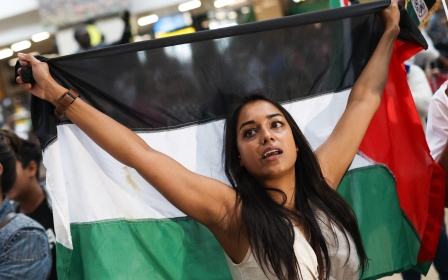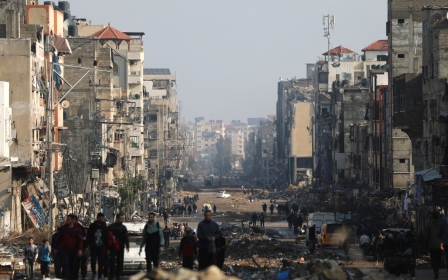War on Gaza: Displaced Palestinians find no shelter in Rafah
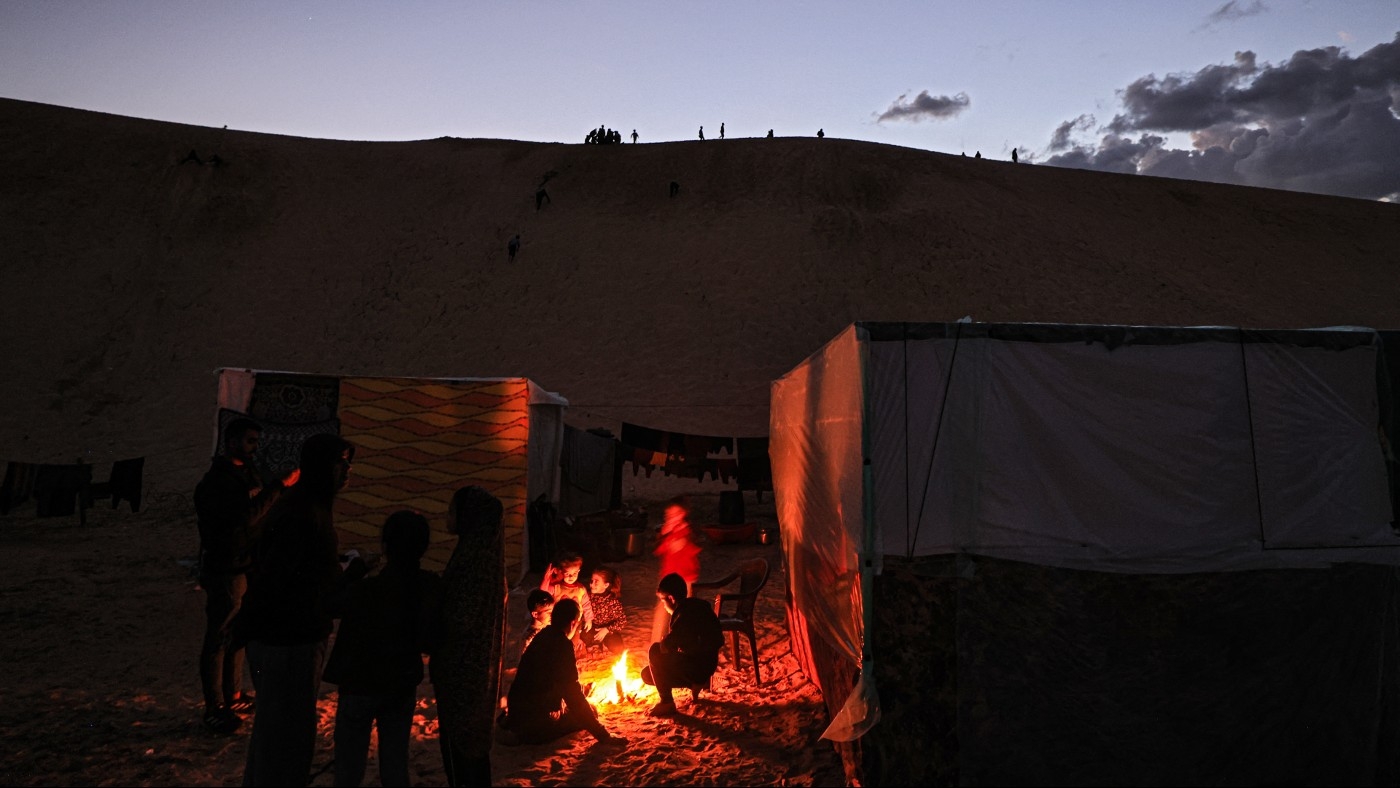
Arriving at al-Mawasi, a town close to Rafah on Gaza’s southern border with Egypt, 37-year-old Rasha Mansour found “nothing but sand and an empty place with no tents”.
Mansour, her husband and their five children, left their home in central Gaza’s al-Bureij refugee camp two weeks ago, after Israel ordered its residents to move to the adjacent Deir al-Balah, or to head south to Rafah, which is now home to more than a million displaced Palestinians.
With no space available at Deir al-Balah, Mansour told her husband she thought they should travel to Rafah, “so that we would not be forced to move anywhere again”.
The war had already hit the family hard. A month in, Mansour told Middle East Eye, Israel was bombing their camp, despite assurances that it was safe.
“During the second month of the war, I lost my younger brother Abdul Rahman and my uncle’s family. The missiles fell on my uncle’s house, next to us, and all my relatives in the building were killed. My uncle, his grandchildren, his daughters and my brother.”
New MEE newsletter: Jerusalem Dispatch
Sign up to get the latest insights and analysis on Israel-Palestine, alongside Turkey Unpacked and other MEE newsletters
“My mother and father have been in Egypt for several months to treat my father. We are living in the most difficult circumstances without our parents.”
'The tent is not a solution. We need the war to stop, and we need to be allowed to return to our homes'
- Rasha Mansour, Gazan resident
Soon after, Mansour and her family fled south. “I took with me a blanket and enough bedding for the family and some other things,” she said. Arriving in al-Mawasi, they found an overcrowded seaside wasteland.
“It was difficult to get a tent. I was very afraid to sit in the open without shelter with my three girls… We stayed there for two days with great difficulty. I felt as if I was on the street. The place was crowded with people. Some of them were making nylon tents for themselves, some were forced to sleep on the ground without a mattress.”
Mansour’s husband went looking for a tent and was told that some were being sold for as much as 2,000 shekels ($540), a price the family couldn’t afford.
“We made a tent of cloth and sat in it,” the mother said. “We have left our homes, which used to be safe and warm, and now we are here in this empty place, in a tent of cloth. It is winter and is very cold.”
Around 1.9 million people have now been displaced from their homes in Gaza, with many of them heading south to Rafah and nearby al-Mawasi because these areas are considered safer than others, and also this is where the Israeli military has told them to go.
Dire conditions
In a post on Telegram, Palestinian health ministry spokesman Ashraf al-Qudra said that infrastructure and medical services in Rafah could not handle the needs of an estimated 1.3 million displaced people.
In the last couple of days, Israel has rained down air strikes on Rafah, hitting homes sheltering displaced families and killing a reported 135 people. Rafah is the only Gaza border crossing not controlled by Israel, but according to the Wall Street Journal, Israeli officials have told Egypt they are planning a military operation on the Gaza side, where the displaced Palestinians are currently sheltering.
These Palestinians face dire conditions out in the open. “At any moment, rain could fall,” Mansour said. “Thousands of citizens are in the street without a tent or shelter. The tent is not a solution. We need the war to stop, and we need to be allowed to return to our homes. We have lived through the Nakba of 1948, but what we are experiencing now is much more difficult.”
In the city of Rafah, 40-year-old Rami Abu Quddus spends his days looking for somewhere he, his wife and three children can find shelter, after they were forced to leave Nuseirat camp in the middle of the Gaza Strip.
“The tent is not a good place to live,” he told MEE. “I have three children who have not recovered from the cold. We share appeals on social networking sites for a tent that is at least suitable for living, but there’s nothing. Everything requires money and is twice the price. The tent, food and drink and everything else are very expensive. I don’t want to spend nearly $500 on a tent that will not protect us from the winter.”
Abu Quddus said that some areas of al-Mawasi and other parts of Rafah had been bombed by Israel. “The Israeli army is not showing anyone mercy during this war. I cannot provide safety for my children. We, the displaced, are experiencing great suffering in Rafah. The army is pushing us there, knowing the city will explode due to the increase in population.”
According to Abu Quddus and other displaced Palestinians in Rafah, there is not enough food in the city. “If I do not find any canned goods in the market, my family will never find anything to eat,” he said. The city does not have the services and infrastructure to deal with the number of people that have fled to it and the humanitarian situation is deteriorating rapidly as a result.
“The Israeli army is still asking citizens to evacuate their residential areas in the city of Khan Younis and go to Rafah,” Abu Quddus said. “How long will we remain displaced like this? Are the tents we live in now acceptable?”
His life and the lives of those around him shattered, Abu Quddus talked to MEE about everything that had been lost to Israel’s ongoing bombardment. “I had dreams and a future for my children,” he said.
“I work as a teacher in a school and I had a beautiful daily routine. I want it back again. I want the war to end without losing anyone from my family. I miss my home, my neighbours, my camp.”
The teacher paused. “I want to return to my life, to leave this tent that I made from some nylon, that does not protect us from the cold or the light. I want to leave the explosions at night, the deadly quiet during the day.”
Middle East Eye delivers independent and unrivalled coverage and analysis of the Middle East, North Africa and beyond. To learn more about republishing this content and the associated fees, please fill out this form. More about MEE can be found here.


